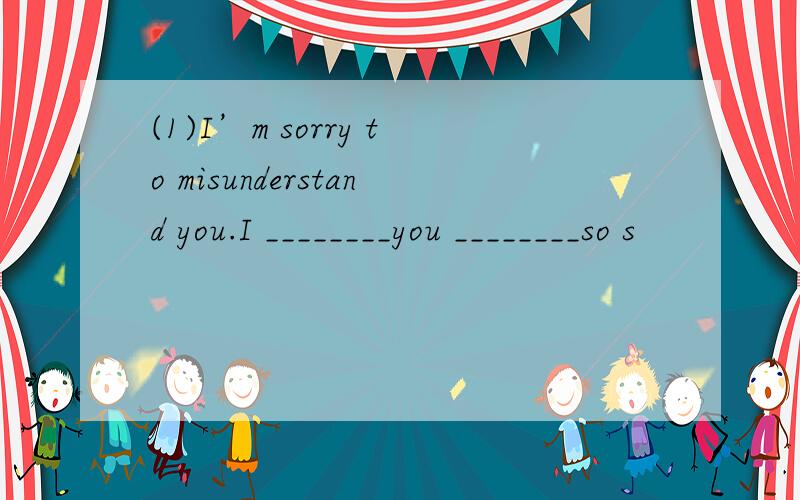(1)I’m sorry to misunderstand you.I ________you ________so s
来源:学生作业帮 编辑:神马作文网作业帮 分类:英语作业 时间:2024/11/16 23:07:50
(1)I’m sorry to misunderstand you.I ________you ________so serious.
A.don"t think ;are
B.didn"t think ;were
C.have thought ;weren"t
D.thought ;hadn"t been
(2)The little girl __________out at night
A.dares not go
B.daren"t to go
C.dares not to go
D.doesn"t dare go
(3)It ________to me that I should pay a visit to my friend Jane next week
A.happened B.supposed C.proved D.occurred
D D,请给我解释,
A.don"t think ;are
B.didn"t think ;were
C.have thought ;weren"t
D.thought ;hadn"t been
(2)The little girl __________out at night
A.dares not go
B.daren"t to go
C.dares not to go
D.doesn"t dare go
(3)It ________to me that I should pay a visit to my friend Jane next week
A.happened B.supposed C.proved D.occurred
D D,请给我解释,

(1)句子意思是我以为你不会那么认真.
首先很显然事情是过去时,排除A合C,
像楼上说的,这是否定前移,珠峰石在2007-4-25 22:27:00的发言:
“钱歌川疑难解答中有讲解.并非铁律!
我认为所谓的否定前移是相对于汉语表达法而言的.
汉语一般说:我认为你不对.几乎没听到过一个纯中国人(没有接触过洋文的中国人
)说:我不认为你是对的.
而英语中表达这样的意思,一般说:I don't think you are right.因此有语法学家
就总结出这么一个规律:否定前移.这条语法规则经老师重复几十遍,做了几十题之
后,就以为这是法律,任何句子不得违反了!
我认为,这是老外的一种委婉的表达方法.思考一下,它是不是比:I think you are
not right.要来得委婉呢?
I don't think you are right.是你是对的,只是我不这么认为而已.我有可能是错
误的.
而I think you are not right.你是不对的,我就是这么认为的.怎么了?到哪里我
都这么说!
从这一点上讲,老外比我们文明,你也可以说是虚伪!”
所以选B
(2)dare的用法
1) dare用作实义动词,此时其后的动词不定式可带to也可不带to,且dare有人称和
数以及时态的变化.例如:
I dare to jump down from the top of the wall.我敢从那墙头上跳下来.
She doesn\'t dare (to) meet her teacher\'s eyes.她不敢与老师对视.
2) dare用作情态动词,后跟动词原形,主要用于疑问句、否定句和条件句中.例如
:
How dare she do things like that to me?她怎么敢对我做那种事?
-Dare you catch the mouse?你敢去抓那只老鼠吗?
-I daren\'t do that.我不敢抓.
If you dare say that to our teacher,I would vote for you.如果你敢向我们的
老师说那件事,我就投你一票.
在这个题中dare是情态动词,所以选D
(3)happen 作“发生、碰巧”解,一般用于偶然或突发性事件.例如:
What happened to you?(一般不说:What did you happen?)
Maybe something unexpected happened.
I happened to see him on my way home.
= It happened that I saw him on my way home.
be supposed to (do)
1.…(在职务上)要,应该
You are supposed to be here at eight every day.
你应该每天八点钟到这里.
2.〔用于否定句〕〔口语〕不许,不准
You're not supposed to smoke here.不许你在这儿吸烟.
prove
v.
1.证明,查验,显示
vi.
1.证明是;原来是[L]
My advice proved to be wrong.
我的意见证明是错的.
The rumor proved true.
这谣传结果是真的.
He proved a competent manager.
他证明是一个能干的经理.
vt.
1.证明,证实;【律】验证,检定
I'll prove to the world that he was right.
我将向世人证明他是对的.
She has proved herself unreliable.
她的表现说明她靠不住.
The lawyer proved the innocence of his client.
律师证实了他的当事人的清白.
2.试验; 考验
3.勘探; 钻探; 探明(up)
4.【数】证,验算
5.【刷】试印,把...印成 校样
6.检定(遗嘱等)
occur
通常用occur to sb.表示 想起/想到
e.g.it never occured to me.我从来没有想到过;
单独occur一般作 发生 发现的意思 = happen
e.g.When did this accident occer?
这起事故是什么时候发生的
根据意思判断,句子意思是“我突然想起,下周我该去拜访一下我的朋友Jane了”
happen强调偶然性的发生什么事
suppose的基本意思是“猜想;以为;假定”,翻译不通.
prove是“证明,证实;验证,检定”的意思,也翻译不通.
occur to sb.表示 想起/想到
所以选occured
首先很显然事情是过去时,排除A合C,
像楼上说的,这是否定前移,珠峰石在2007-4-25 22:27:00的发言:
“钱歌川疑难解答中有讲解.并非铁律!
我认为所谓的否定前移是相对于汉语表达法而言的.
汉语一般说:我认为你不对.几乎没听到过一个纯中国人(没有接触过洋文的中国人
)说:我不认为你是对的.
而英语中表达这样的意思,一般说:I don't think you are right.因此有语法学家
就总结出这么一个规律:否定前移.这条语法规则经老师重复几十遍,做了几十题之
后,就以为这是法律,任何句子不得违反了!
我认为,这是老外的一种委婉的表达方法.思考一下,它是不是比:I think you are
not right.要来得委婉呢?
I don't think you are right.是你是对的,只是我不这么认为而已.我有可能是错
误的.
而I think you are not right.你是不对的,我就是这么认为的.怎么了?到哪里我
都这么说!
从这一点上讲,老外比我们文明,你也可以说是虚伪!”
所以选B
(2)dare的用法
1) dare用作实义动词,此时其后的动词不定式可带to也可不带to,且dare有人称和
数以及时态的变化.例如:
I dare to jump down from the top of the wall.我敢从那墙头上跳下来.
She doesn\'t dare (to) meet her teacher\'s eyes.她不敢与老师对视.
2) dare用作情态动词,后跟动词原形,主要用于疑问句、否定句和条件句中.例如
:
How dare she do things like that to me?她怎么敢对我做那种事?
-Dare you catch the mouse?你敢去抓那只老鼠吗?
-I daren\'t do that.我不敢抓.
If you dare say that to our teacher,I would vote for you.如果你敢向我们的
老师说那件事,我就投你一票.
在这个题中dare是情态动词,所以选D
(3)happen 作“发生、碰巧”解,一般用于偶然或突发性事件.例如:
What happened to you?(一般不说:What did you happen?)
Maybe something unexpected happened.
I happened to see him on my way home.
= It happened that I saw him on my way home.
be supposed to (do)
1.…(在职务上)要,应该
You are supposed to be here at eight every day.
你应该每天八点钟到这里.
2.〔用于否定句〕〔口语〕不许,不准
You're not supposed to smoke here.不许你在这儿吸烟.
prove
v.
1.证明,查验,显示
vi.
1.证明是;原来是[L]
My advice proved to be wrong.
我的意见证明是错的.
The rumor proved true.
这谣传结果是真的.
He proved a competent manager.
他证明是一个能干的经理.
vt.
1.证明,证实;【律】验证,检定
I'll prove to the world that he was right.
我将向世人证明他是对的.
She has proved herself unreliable.
她的表现说明她靠不住.
The lawyer proved the innocence of his client.
律师证实了他的当事人的清白.
2.试验; 考验
3.勘探; 钻探; 探明(up)
4.【数】证,验算
5.【刷】试印,把...印成 校样
6.检定(遗嘱等)
occur
通常用occur to sb.表示 想起/想到
e.g.it never occured to me.我从来没有想到过;
单独occur一般作 发生 发现的意思 = happen
e.g.When did this accident occer?
这起事故是什么时候发生的
根据意思判断,句子意思是“我突然想起,下周我该去拜访一下我的朋友Jane了”
happen强调偶然性的发生什么事
suppose的基本意思是“猜想;以为;假定”,翻译不通.
prove是“证明,证实;验证,检定”的意思,也翻译不通.
occur to sb.表示 想起/想到
所以选occured
I'm sorry I can't find the book you want to borrow. I have s
I'm sorry I love you, that's what I want to say 是什么意思?
I'm sorry to keep you waiting.
I 'm sorry to bother you
I'm sorry to trouble you.
I'm so sorry to you .
I'm sorry to bother you ,but can you tell me to way to the s
--I'm sorry I can't go to the movies with you.--oh ,that's t
i`m sorry to have disturbed you 改成 i`m sorry to disturb you行
Thank you for your letter .I'm sorry to hear that you have s
英语语法问题-时态1)Oh,it's you,I'm sorry I ______know you _________h
To tell I love you,I'm sorry complement sentence!